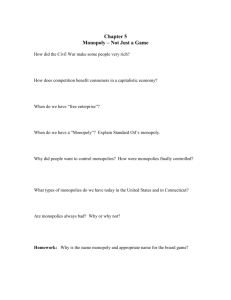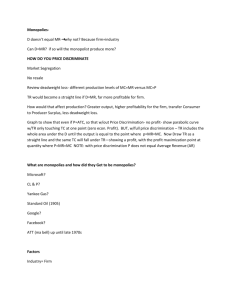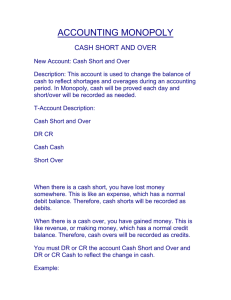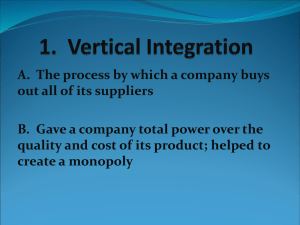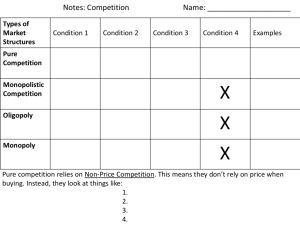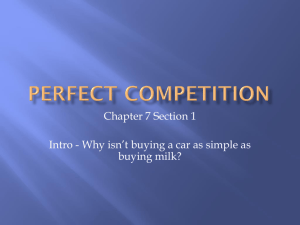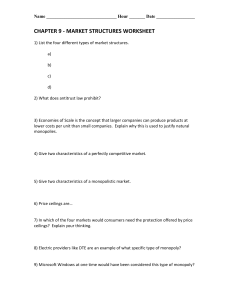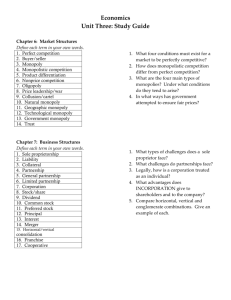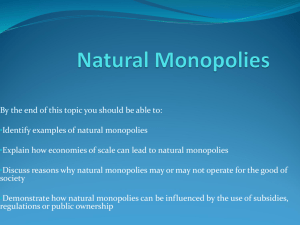What is a monopoly?
advertisement
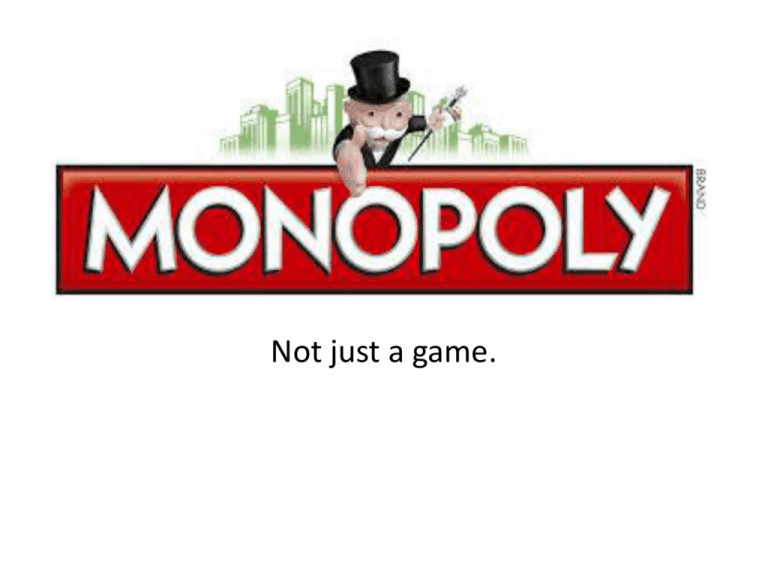
Not just a game. What is a monopoly? • A monopoly is a market dominated by a single seller. • It has one seller and many members of buyers. • Monopolies are able to take advantage of the market, therefore they can charge high prices. • Barriers to entry are the principle condition that allows monopolies to exist. *In 1890 The Sherman Antitrust Act was passed to prohibit abusive monopolies. Economies of Scale • Factors that cause a producer’s average cost to drop as production increases. • With no economies of scale the average cost of producing each good increases as output increases Effect of Economies of Scale Natural Monopoly • Market that runs most efficiently when one large firm provides most of the output. • If a second firm enters a market, competition will drive down the market price. • The government steps in to ensure that the firms wouldn’t waste resources building additional plants when only one is needed. • A firm with natural monopoly agrees to let government control the prices it can change and what services it must provide. Natural Monopoly Examples • Ex. Public Water- If many different companies decided to produce water, they would set up overlapping pipes and pumping stations to deliver water to the same place. They would be wasting a lot of resources and money. So natural monopoly would have to take place. Government Monopoly • Monopoly created by the government • The government creates barriers to entry in the market. Technological Monopolies • Government can give a company monopoly power by issuing a patent. • Patent- gives a company exclusive right to sell a good or service at a specific date or time. • Patents guarantee that companies can profit from their own research without competition. • Firms that have patents are allowed to set prices that maximize their opportunity to make a profit. Technological Monopolies Examples • Ex. Choc O’late, who works for Hershey's Chocolate Company, invents a new chocolate bar. The FDA will give Hershey’s a patent for 20 years, for them to exclusively sell Mr. O’late’s chocolate bar. Franchise • Contract that gives a company the right to sell its good. • A franchise is a chain company, such as Mcdonalds, Target or Walmart. License • Granting firms the right to operate a business. • A license is the right to practice. • Just like your drivers license allows you the right to operate a car, a government issued license grants a firm the right to operate a business. License • Ex. Kim and Jerry just graduated from Veterinary school and they want to own their own veterinary office. First they must get a license to be legal vets. So they can fulfill their dream of saving animals lives. Price Discrimination • A monopolist may be able to divide consumers into two or more groups and charge different prices to each group… whoa. • As a basic principle consumers set a maximum price they will pay for a product. • Monopolists will charge one group a higher price because that group is willing to pay more. Price Discrimination Example • Mr. Alka-Seltzer comes to Arlington High School to sell his action figures with life like hair, and he notices that Tommy and Sara are buying a lot of action figures each week. Whereas Shelly and Miguel are buying only a few each week. Tommy and Sara are buying twice as many toys as Shelly and Miguel so Mr. Alka- Seltzer decides that if he charges less to Shelly and Miguel he will make more money. Market Power • The ability to control prices and total market output. • Market power and price discrimination will be found in any market structure except for perfect competition. • The ability of a company to change prices and output like a monopolist.
